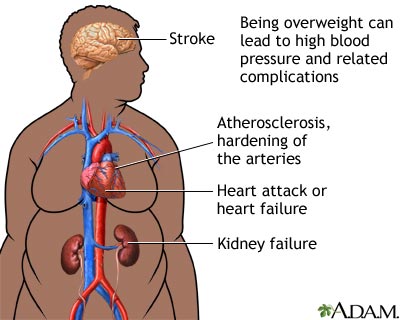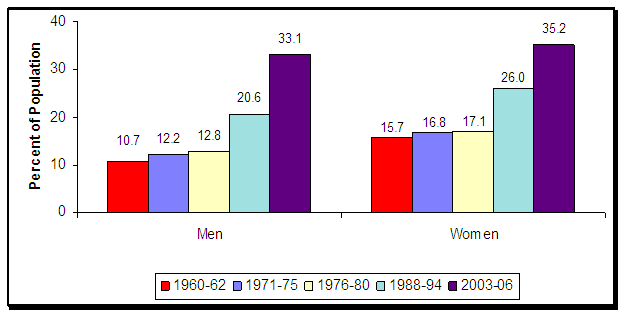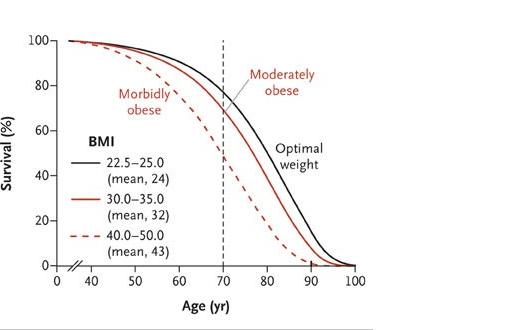Overweight and obesity is a medical condition in which excess body fat has accumulated to the extent that it may have an adverse effect on health, leading to reduced life expectancy and/or increased health problems.
Two-thirds of American adults are overweight and one-third are obese.
Body Mass Index (BMI), a measurement which compares weight and height, defines people as overweight when their BMI is between 25 kg/m2 and 30 kg/m2, and obese when it is greater than 30 kg/m2. Obesity increases the likelihood of various diseases, particularly heart disease, type 2 diabetes, high blood pressure, certain types of cancer, and osteoarthritis:

(From: http://healthguide.howstuffworks.com)
Obesity is most commonly caused by a combination of excessive dietary calories, lack of physical activity, and genetic susceptibility, although a few cases are caused primarily by genes, endocrine disorders, medications or psychiatric illnesses.
Estimates suggest that obesity accounts for 5 to 15% of deaths each year in the United States. The prevalence of overweight and obesity changed little until the 1980s, but in the past 15 years obesity rates have increased by 48%:
Age-adjusted prevalence of obesity in Adults ages 20-74 by sex and survey. (NHES, 1960-62; NHANES, 1971-74, 1976-80, 1988-94 and 2003-2006). Source: Health, United States, 2008. NCHS. Overweight (BMI, 25.0 to 29.9), obese (BMI, 30.0 to 34.9; obesity class I), and morbidly obese (BMI, ≥35.0; obesity classes II and III)
Morbid obesity shortens life expectancy by approximately 10 years, and moderate obesity shortens it by approximately 3 years:
Since many of the negative effects of obesity on health are manifested in chronic diseases, it is encouraging that control of other risk factors for cardiovascular disease, such as high cholesterol and hypertension, has improved over the past 40 years, particularly among those who are overweight or obese. An important exception to this trend is diabetes, the prevalence of which is at an all-time high and continues to increase rapidly. Improved treatment of obesity-related diseases is thus vital to improving the nation’s health.
The primary and best treatment for obesity is proper nutrition and physical exercise. In severe cases, surgery (gastric bypass) may be needed to reduce stomach volume and the ability to absorb nutrients from food.
(From: Forecasting the Effects of Obesity and Smoking on U.S. Life Expectancy, Susan T. Stewart et al. N Engl J Med 2009;361:2252-60)


